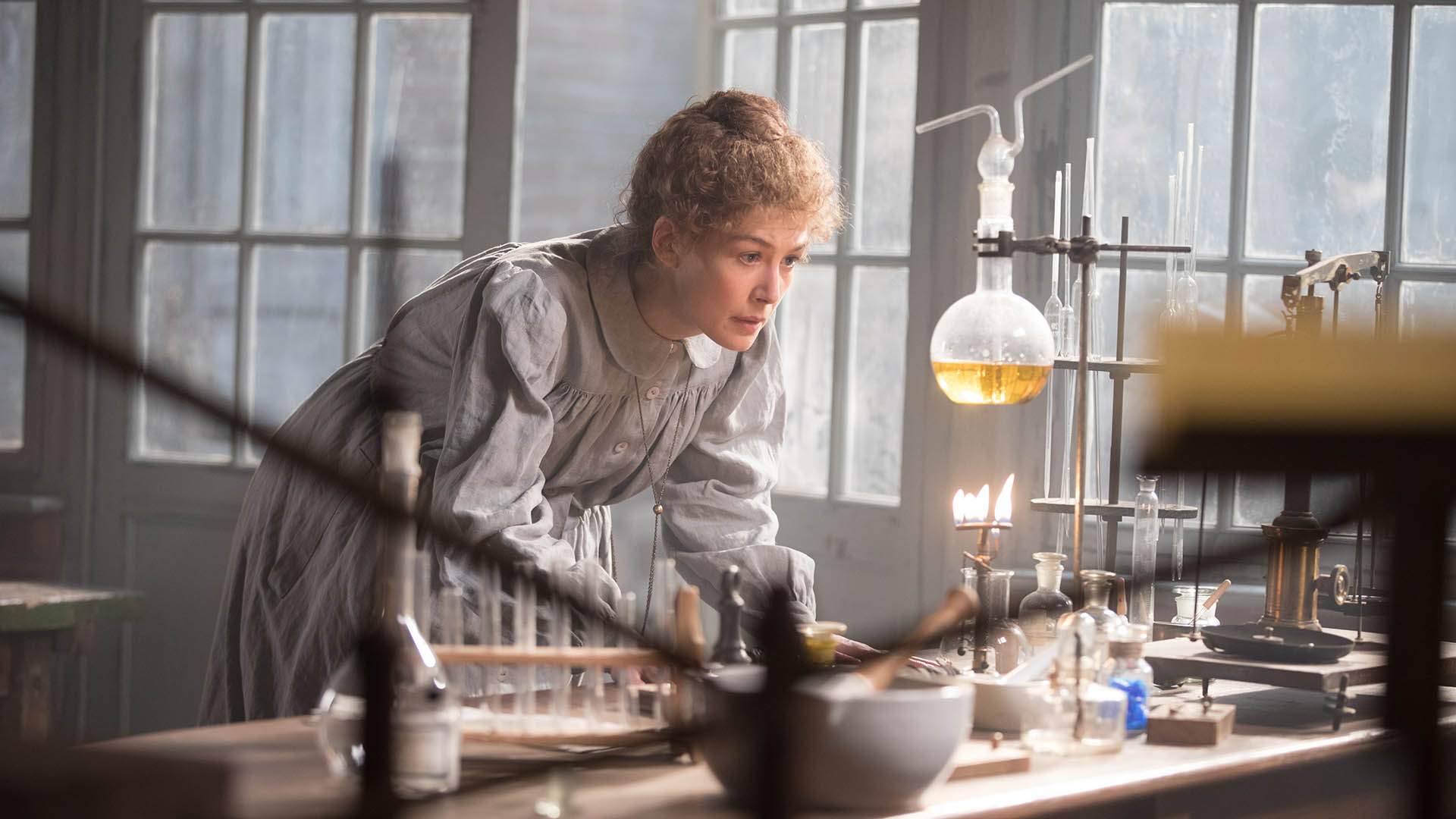Radioactive
There's much that's standard about this Marie Curie biopic — but it isn't without its interesting, probing and thoughtful elements.
Overview
Even without sourcing and quoting an exact number, it's obvious that an immense amount of people owe their lives to Marie and Pierre Curie's research on radioactivity. Without their work — Marie's passion project, which she reluctantly agreed to collaborate on with Pierre after they first crossed paths in Paris — cancer treatment would've likely been vastly different over the past century. The results for scores of cancer patients would've been as well. But the pair's discovery of two new elements, radium and polonium, also led to disturbing side effects and cataclysmic events that changed the course of history in other ways. Radioactive touches upon both, from life-saving oncology usage and the ability to conduct x-rays on World War I battlefields to the bombing of Hiroshima and Chernobyl's nuclear reactor meltdown.
It might seem strange for a biopic about Marie to leap forward at different moments, jumping to years and decades past her death in 1934, all to show how the physicist and chemist's work made and continues to make a colossal impact upon the world. But that's the most interesting thing about Radioactive: its willingness to contemplate both the significant benefits and proven dangers of Marie (Rosamund Pike, an Oscar-nominee for Gone Girl) and Pierre's (Sam Riley, Rebecca) pioneering discoveries. The latter is tasked with vocalising this battle in his acceptance speech for their shared 1903 Nobel Prize in physics, acknowledging the struggle but opining that "mankind will derive more good than harm". The film doesn't simply take him at his word, however. It shows his radiation sickness, and Marie's. It touches upon the backlash when news of radioactivity's health effects started becoming widely known. And those aforementioned flash-forwards to both positive and negative applications of the Curies' research keep the same conversation going, because Radioactive doesn't try to offer a right or wrong answer.
Instead, as directed by Marjane Satrapi (The Voices), Radioactive recognises how the efforts of an astonishing woman have led to a complex array of outcomes. The movie doesn't weigh up saving the cancer-afflicted against deaths contributed to nuclear atrocities, but shows how they're both consequences of her work — and that, even though she died before some of the events mentioned above, Marie grappled with the pros and cons of her discoveries herself. This is such a crucial part of this adaptation of Lauren Redniss' graphic novel about the Curies, in fact, that it stands out in multiple ways. Curie deserves all the praise and acclaim that have been showered upon her, and this is an affectionate film, but Radioactive isn't a glossy exercise in hero worship. That said, the movie's complications and probing stem primarily from its unconventional line of thinking; take out the clips in a 50s hospital, in Japan, in the Ukraine and at a nuclear bomb test in Nevada in 1961, and a far less thoughtful feature would result.
After an opening glimpse of an elderly Marie collapsing in her Paris laboratory, Radioactive heads back to 1893, where she's one of few female scientists in the French city. Expectedly given the era, she's reviled by her male peers and the decision-making powers-that-be — but a goateed Pierre has already heard of her when they meet-cute in the streets over a microbiology book. Marie is adamant that she be judged on her own merits, and that of her work, so she's resistant to his early professional advances. But the fact that she's kicked out of her existing lab space on the day she initially makes her future husband's acquaintance sets obvious wheels in motion. Being seen as an equal is a fight she'll keep waging, even after not one but two Nobel Prizes come her way. Pierre never regards her otherwise, but altering the scientific establishment and society in general's minds is a far tougher job.
By design, it's dismaying how familiar Marie's treatment feels; her work has changed the world, but engraining gender equality as a given sadly doesn't rank among her achievements. The same can be said about the race-based attacks she's forced to weather, with her Polish background used as an insult to a chilling degree in early 20th-century Europe. Satrapi has brought similar themes and experiences to the screen before, as evidenced in 2007's Persepolis. Based on her own autobiographical comics about growing up in Iran and Austria both during and after the Islamic Revolution, it unsurprisingly felt far more urgent and personal — two traits that Radioactive lacks. From fast-paced montages of Marie and Pierre's scientific experimentation to snippets of their home life as their family expands with their fame, the process of detailing the Curies' lives largely takes on a routine air, with much of Jack Thorne's (Dirt Music, Enola Holmes, The Secret Garden) script reading from the biopic playbook.
Thankfully, Radioactive looks as textured as its best moments feel, and sometimes as bold as well. That it springs from an illustrated text, and that Satrapi has experience in the medium herself, comes across in stylised frames shot by cinematographer Anthony Dod Mantle (The Undoing) that could've leapt from a page. The film also benefits from not only Pike as Marie, but Anya Taylor-Joy (Emma) as the adult version of her eldest daughter Irène, another Nobel Prize-winner. There's a spiky determination to both — a willingness to forge on with doing the right thing despite seemingly insurmountable obstacles — that effortlessly links their performances. Of course, Radioactive also asks Pike to spend its first half asserting that Marie will never be defined by a man, then to spend its second struggling when Pierre is killed. That plays a little too neatly, but it's actually in tune with the many contrasts that sit at the film's core; something can be two things at once, after all, as Radioactive's rumination upon the Curies' discoveries firmly shows.





